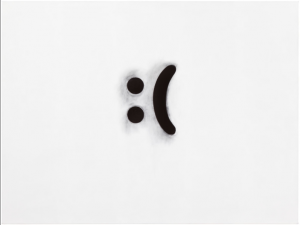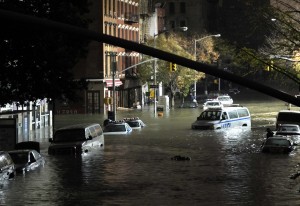A People-First Approach to Climate Justice: Thinking Jewishly About Change

Mel Bochner, "Colon Open Parenthesis," 2001
“Mel Bochner: Strong Language” is on view at The Jewish Museum in New York through September 21.
If you are among the despairing would-be climate activists of the world — overwhelmed by the scope of the problem, frustrated by lack of political will, horrified by the ever-more-dire predictions of climate scientists, and simultaneously consumed with both the urgency and the hopelessness of the situation — you are not alone.
As understanding grows that climate change is happening in the here and now — good-bye, Antarctic ice sheet — and that it poses a military threat and endangers corporate bottom lines, even people in corporate boardrooms and executive offices are beginning to pay attention. Our planet’s climate is changing because of things we humans have done, and I stand — and sometimes hide under my covers — right there with you, terrified.
If there is any peace to be found in our exasperation over the lack of societal will to do anything meaningful to mitigate climate change, it is this: anthropogenic (human-caused) climate change is a completely new problem. Think about it. Over the course of human history, we’ve faced war, famine, and disease — pretty much the whole time. But global warming? It’s brand-new!
We shouldn’t be so surprised, then, that in the 30 years or so since we’ve really been talking about climate change — a millisecond of time, relative to the span of human history — we haven’t pulled it together to change our ways yet. We are all figuring this out as we go.
Sure, I Like Polar Bears, but Let’s Talk about People
So. Let’s take a deep breath and commit to doing everything we can to respond to global warming in a meaningful, effective way, and quickly. Remember, we took action to protect the ozone layer — admittedly, a simpler challenge than climate change, with less complex solutions — but still, it shows that global action is possible.
But first: we have got to stop approaching climate change as an environmental issue.
The environmental movement is seen by many — if not most— as the domain of white, upper-middle class, hybrid-drivin’, long-haired, tie-dye wearin’ hippie tree huggers who care more about whales than they do about people.
Don’t get me wrong. I like whales. I might have hugged a tree or two in my day. But the minute I call myself an environmentalist, people often put me in an easily dismissible box — and I can’t blame them. From those who identify as environmentalists, I’ve been hearing plenty of laments for the earth, prayers celebrating the interconnectedness of all life, and alarm about disappearing habitat, but far too little concern about how climate change impacts people.
Here’s the thing. Our current climate crisis isn’t just bad for frogs or whales or polar bears. It is bad — really bad — for people. Especially poor people, and people of color. Climate change means increased drought and wildfires, famine and probable social unrest, the spreading of disease, reshaped coastlines due to rising seas, and something we’re already seeing but that’s hard to quantify: climate refugees.
In the face of all this, the more that white environmentalists lament the destruction of the rainforest and the possible (let’s admit it, likely) extinction of the polar bears the less anyone wants to listen—especially when poor kids in urban neighborhoods have cancer and asthma from air pollution and when, after a storm possibly made more intense due to climate change destroys a neighborhood, it’s the working poor who are stuck without the means to rebuild or to move somewhere safer.
A Jewish Compass for Navigating Climate Change
While the climate crisis and our human fumbling to respond to it are new, our religious traditions are not. In the Jewish tradition, we’re in the year 5774. That’s 5774 years of accumulated experience with and wisdom about human potential, fragility, and failings. Our tradition can offer us significant guidance to navigate the new wilderness of global warming, if we’ll let it.
One of the major tenets of Judaism is a concern for justice. We are commanded to care for the widow, the orphan, the stranger — those people who, in biblical times, were most on the margins of society. We are to leave the corners of our fields unharvested, so that the poor among us can get food without having to beg. In Deuteronomy, we are commanded: “Tzedek, tzedek, tirdof” — “Justice, justice, you shall pursue!”
In the Hebrew Bible, we learn that we are interconnected with all life, and that plants and trees and animals have inherent value and worth apart from their usefulness to humans — God, in God’s wisdom and love, created all life and called it good. Yes! And so it is good and right that we care about butterflies, tree frogs, and polar bears.
Shifting Focus: Putting People First
But right now, in this moment of figuring out how to move forward in our new landscape of global warming — in this unprecedented wilderness — we need to come together as a human family and focus on our human sisters and brothers. Our concern, speech, and action on climate concerns must first and foremost be about justice for people.
Would more people start listening to climate concerns if they understood just how much climate change affects people? Maybe. But there’s more at stake:
• When our main focus in climate work is on nature, habitat, and the suffering of creation, it’s all too easy for the fossil fuel industry and those whose identity is wrapped up in our unsustainable consumption-based economy to push forward a dismissive narrative of “jobs vs. the environment.” That narrative is: we can either have good jobs for people OR a good environment.
• When we advocate strongly for a good environment AND good jobs in healthy, sustainable communities, that false narrative falls apart.
When our main focus is on nature, habitat, and the suffering of creation, then we are just depressed. All the time. Honestly, there’s not a lot any one person can do to save the rainforest or reverse the bleaching of coral reefs; all we can do is sound a woeful cry of alarm, like Jeremiah, and lament.
Creating Tzedek-Centered Communities
If we focus instead on creating just, healthy, and sustainable local communities, then we open incredible opportunities to build new relationships and to help improve conditions for individual people as well as for whole groups. We can make a real, tangible, and hopeful difference — for others as well as for ourselves. In this way, our work on climate can be soul-filling rather than soul-draining.
The first step in such an approach is to reach out and build relationships with people and communities different than our own. I know; building relationships is slow, hard work — and our climate crisis is so pressing! I have come to believe, though, that building these bridges is the most important thing we should all be doing right now, and the first step in creating truly tzedek-centered communities.
Here, some biblical guidance from this week’s Torah portion:
• For the first 13 months or so that the Israelites wander in the wilderness, they are busy figuring things out. They find water and food; accept the gift of Torah; construct the Mishkan, or Tabernacle; and receive instruction on the mitzvot, God’s commandments. All of these are necessary and life-giving tools for surviving in the wilderness and knowing what to do once they reach their destination.
• Once all that is complete, I imagine the people are pretty eager to get to the Promised Land. After all, it isn’t that far away. Maybe a few know how to get there and are planning to charge ahead on their own. God has a different idea about how the Israelites should journey toward the Promised Land, however.
• In the opening of Numbers, God tells Moses that it is time to get organized as a whole, interconnected community. The people should count themselves and let each person’s name be known. Only after all the people are lifted up as individuals, yet still connected to their families and tribes, can they organize themselves and move forward as one cohesive community toward the Promised Land.
Our climate crisis is terribly urgent. If we’re going to respond to it in an effective, meaningful, and integrated way, though, we need to work together. It’s time for us to pause, here in the wilderness, and count ourselves — to connect with those people and communities who are different from us but with whom we now travel. Our greatest hope for a meaningful and effective climate movement will be found in creating better-connected, resilient communities.
Our climate challenge is a whole-earth, whole-human problem — and our response to it must bring all people — and with us, all of creation — into a new, healthier, and sustainable global future, together.
What can I do?
Dig into your local community, together with a few friends. Create a study group, a team from your congregation, a youth group with their adult leaders, etc. Together, find out who’s doing what in your community. Once you’ve identified what’s already being done, then you can focus on how well the different parts of your community are working together — and you can take steps to help it become more resilient in our new era of climate change:
Climate Adaptation & Disaster Response: How is climate change expected to impact (and/or already impacting)[your area] (http://nca2014.globalchange.gov/report#section-1948)? If some impacts (for example, flooding) will be worse in certain areas of town, which areas—and who lives there? Does your community have plans in place to effectively respond when and if climate-related disaster hits?
Climate Mitigation: Are there programs in place in your community to help people with low-incomes weatherize their homes to become more energy-efficient and save money? Are there job training or education opportunities to help people gain skills for new businesses or industry as we transition away from a fossil-fuel based economy?
Environmental Justice: Where are polluting industries located in your community, and what neighborhoods are most affected by their activity? Who is working on air pollution and toxics issues in your community, and how might your group learn from them?
Yaira A. Robinson is the Associate Director of the Texas Interfaith Center for Public Policy and Texas Interfaith Power & Light. She holds a master’s in theological studies from Austin Presbyterian Theological Seminary and has studied religiously-based environmental and food justice with Creation Justice Ministries, Hazon, GreenFaith, and the Siach network. Granddaughter to a Christian minister and daughter to Sufi teachers, she is joyfully and by choice Jewish. She is grateful for her 11-and 13-year-old boys, who add love, laughter, and laundry to her life.
![[the current issue of ZEEK]](../../image/2/100/0/5/uploads/leftistethicistgraphic-52842c6a.png)
- 5000 Pages of Zeek
- Founded in 2001, Zeek was the first Jewish online magazine, and we have over 5000 pages online to prove it, all available free of charge. Read more in the Archive.
More articles by
Yaira A. Robinson
More articles in


